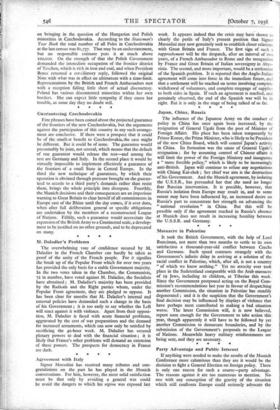Japan, China, Russia The influence of the Japanese Army on
the conduct of policy in China has once again been increased, by the resignation of General Ugaki from the post of Minister of Foreign Affairs. His place has been taken temporarily by Prince Konoe, the Prime Minister, who is likely to be President of the new China Board, which will control Japan's activity in China. Its formation was the cause of General Ugaki's resignation ; for by assuming control of Chinese affairs it will limit the power of the Foreign Ministry and inaugurate a " more forcible policy," which is likely to be increasingly anti-British. Japan will continue to refuse any negotiations with Chiang Kai-shek ; her chief war aim is the destruction of his Government. And the Munich agreement, by isolating the U.S.S.R., has persuaded her that she need no longer fear Russian intervention. It is possible, however, that Russia's isolation from Europe may result in, and to some extent may have been influenced by, an increased desire on Russia's part to concentrate her strength on advancing the " national revolution " in China. But this will be possible only if the agreement reached in Russia's absence at Munich does not result in increasing hostility between the U.S.S.R. and Germany.
* * * *














































 Previous page
Previous page